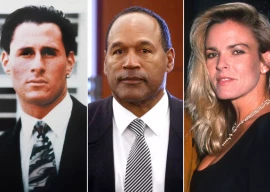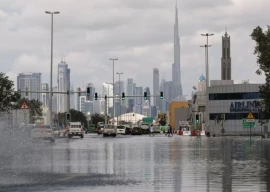
KOHISTAN:
Rival tribes from Kohistan and Gilgit-Baltistan (G-B) continue to hold fast to their respective claims of compensation over an eight-kilometre-strip of land which both groups say they own. Efforts made by a jirga seemed to have gone down the drain as representatives of the two tribes are not willing to step back from the thorny land dispute, The Express Tribune learnt on Sunday.
Locals fear bloodshed when the mehndar (custom of binding two rivals not to bear arms against each other) comes to an end. The period is going to end on September 22.

The conflict is mainly over a strip of land stretching between eight to 10-kilometres on both sides of the Basari check post, which separates Kohistan from Gilgit-Baltistan. This is among the areas demarcated for acquisition for the Diamer-Bhasha dam project.
Both tribes now claim the financial compensation the government is entitled to pay.
Old wounds
The G-B government set up a check post on Karakoram Highway near Basri in 2006 which sparked tension between the two sides and things have not cooled down since.
The differences deepened with the passage of time and both sides often had minor skirmishes over grazing grounds in the area.
On March 1, a tribal jirga from Kohistan and G-B succeeded in brokering a ceasefire between the rival tribes after three days of heavy crossfire between villagers of Harban Nala, Kohistan and Thordas, G-B.
At least seven people had lost their lives and nearly a dozen were injured in firefights. The clashes had started after villagers from Thor said Kohistanis forcibly took 400 goats that were grazing on the disputed land.
The jirga comprised former adviser to G-B CM Haji Amar Jan, Wakeel Shah and Malik Asar Jan representing G-B, and Malik Aurangzeb, Malik Qadam Khan, Malik Mukhtiyar and Malik Syed Amir representing Kohistan. According to a local, Malik Siraj, a mehndar was decided for 40 days during which both parties agreed to resolve the issue through a tribal jirga.
Both parties had blocked Karakoram Highway in December 2013, suspending vehicular traffic on the only land route between China and G-B and the rest of the country. The route remained blocked for four consecutive days and the protest was called off only on the condition that the government would deploy military or paramilitary troops to man the disputed strip till a resolution is reached. The same month, a meeting in Islamabad decided to deploy Rangers there and appointed a judicial commission to decide the ownership of the land.
After several jirgas…
The jirga met again on Friday, September 12 where it failed to convince the tribes to agree upon a solution or pay blood money to the families of the deceased and injured.
“Both sides are unwilling to show flexibility; they will not budge from their previous positions,” Malik Qadam Khan, a member of the jirga, told the media. He said tribal elders of G-B claim they inherit the land as per the map of G-B. The tribal elders of Kohistan are of the opinion that as per the Survey of Pakistan, 1955, the eight-kilometre strip from Harban to Thordas is theirs and they deserve the financial compensation against the Diamer-Bhasha dam project, added Qadam Khan.
“The jirga has exhausted its efforts and failed to bring the two sides to agree to a solution,” said Asadullah Qureshi, another tribal elder. Qureshi feared the two sides will resume the armed conflict, taking positions on hilltops, after the expiry of the armistice on September 22.
He said a boundary commission was announced by the previous government in order to settle the dispute, but there has been no progress in the matter. He feared if the government does not mediate and resolve the conflict this time, law and order can only worsen, leading to more bloodshed.
The people of G-B can access the rest of the country only via Kohistan and Kohistanis own businesses in G-B, making both sides vulnerable, said the elder.
Published in The Express Tribune, September 15th, 2014.
COMMENTS (1)
Comments are moderated and generally will be posted if they are on-topic and not abusive.
For more information, please see our Comments FAQ






















1713425884-0/Tribune-Collage-Feature-Images-(10)1713425884-0-270x192.webp)




















In a failed state, people cannot resolve their issues peacefully with a spirit of compromise. Guns remain the final arbiter. Where is the government and its writ? Strangely, KPK government probably doesn't even consider this to be under their jurisdiction.